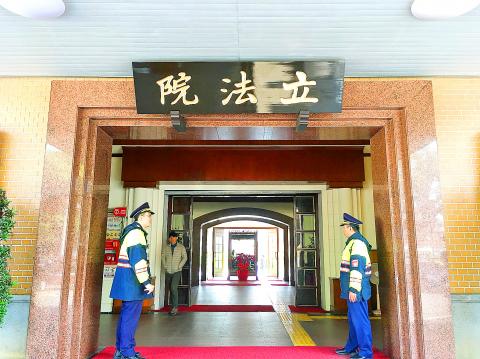Starting on Sept. 1, people who have held office as a deputy minister or higher and military officials who have held the equivalent rank of major general or higher are to be banned from attending political events in China or risk losing their pensions and benefits, the Ministry of the Interior said yesterday.
The Legislative Yuan on July 3 passed an amendment to the Act Governing Relations Between the People of the Taiwan Area and the Mainland Area (臺灣地區與大陸地區人民關係條例) stipulating the new rule, while the ministry yesterday announced the date of promulgation.
The amendment increases the punishment for high-ranking officials found guilty of “undermining national dignity” or visiting China without prior approval.

Photo: Lin Liang-sheng, Taipei Times
China on Oct. 1 is to celebrate the 70th anniversary of the founding of the People’s Republic of China (PRC) with a military parade in Tiananmen Square, the ministry said, adding that Beijing would use the opportunity to wage a “united front” propaganda war.
The amendment must take effect prior to the anniversary so it would have the intended deterrent effect, ministry officials said.
The amendment targets high-ranking officials in government agencies in charge of national defense, foreign affairs, national security and relations with China, as well as the heads of intelligence agencies.
“They are prohibited from taking part in functions or celebrations held by Chinese Communist Party departments, as well as ministries in charge of China’s military and administrative governance and their affiliated organizations,” officials said.
The amendment also bans actions that “undermine national dignity,” including saluting the flag or symbols of the PRC, or singing the Chinese national anthem or songs representing the PRC.
If convicted, officials could be stripped of their pension and benefits, while those who chose a one-time pension payment upon retirement could be fined up to NT$10 million (US$318,847).
No Taiwanese generals attended the “13th Whampoa Forum” in China’s Jiangxi Province in June, the ministry added.

INVESTIGATION: The case is the latest instance of a DPP figure being implicated in an espionage network accused of allegedly leaking information to Chinese intelligence Democratic Progressive Party (DPP) member Ho Jen-chieh (何仁傑) was detained and held incommunicado yesterday on suspicion of spying for China during his tenure as assistant to then-minister of foreign affairs Joseph Wu (吳釗燮). The Taipei District Prosecutors’ Office said Ho was implicated during its investigation into alleged spying activities by former Presidential Office consultant Wu Shang-yu (吳尚雨). Prosecutors said there is reason to believe Ho breached the National Security Act (國家安全法) by leaking classified Ministry of Foreign Affairs information to Chinese intelligence. Following interrogation, prosecutors petitioned the Taipei District Court to detain Ho, citing concerns over potential collusion or tampering of evidence. The

‘FORM OF PROTEST’: The German Institute Taipei said it was ‘shocked’ to see Nazi symbolism used in connection with political aims as it condemned the incident Sung Chien-liang (宋建樑), who led efforts to recall Democratic Progressive Party (DPP) Legislator Lee Kun-cheng (李坤城), was released on bail of NT$80,000 yesterday amid an outcry over a Nazi armband he wore to questioning the night before. Sung arrived at the New Taipei City District Prosecutors’ Office for questioning in a recall petition forgery case on Tuesday night wearing a red armband bearing a swastika, carrying a copy of Adolf Hitler’s Mein Kampf and giving a Nazi salute. Sung left the building at 1:15am without the armband and apparently covering the book with a coat. This is a serious international scandal and Chinese

Seventy percent of middle and elementary schools now conduct English classes entirely in English, the Ministry of Education said, as it encourages schools nationwide to adopt this practice Minister of Education (MOE) Cheng Ying-yao (鄭英耀) is scheduled to present a report on the government’s bilingual education policy to the Legislative Yuan’s Education and Culture Committee today. The report would outline strategies aimed at expanding access to education, reducing regional disparities and improving talent cultivation. Implementation of bilingual education policies has varied across local governments, occasionally drawing public criticism. For example, some schools have required teachers of non-English subjects to pass English proficiency

NEGOTIATIONS: The US response to the countermeasures and plans Taiwan presented has been positive, including boosting procurement and investment, the president said Taiwan is included in the first group for trade negotiations with the US, President William Lai (賴清德) said yesterday, as he seeks to shield Taiwanese exporters from a 32 percent tariff. In Washington, US Trade Representative Jamieson Greer said in an interview on Fox News on Thursday that he would speak to his Taiwanese and Israeli counterparts yesterday about tariffs after holding a long discussion with the Vietnamese earlier. US President Donald Trump on Wednesday postponed punishing levies on multiple trade partners, including Taiwan, for three months after trillions of US dollars were wiped off global markets. He has maintained a 10 percent